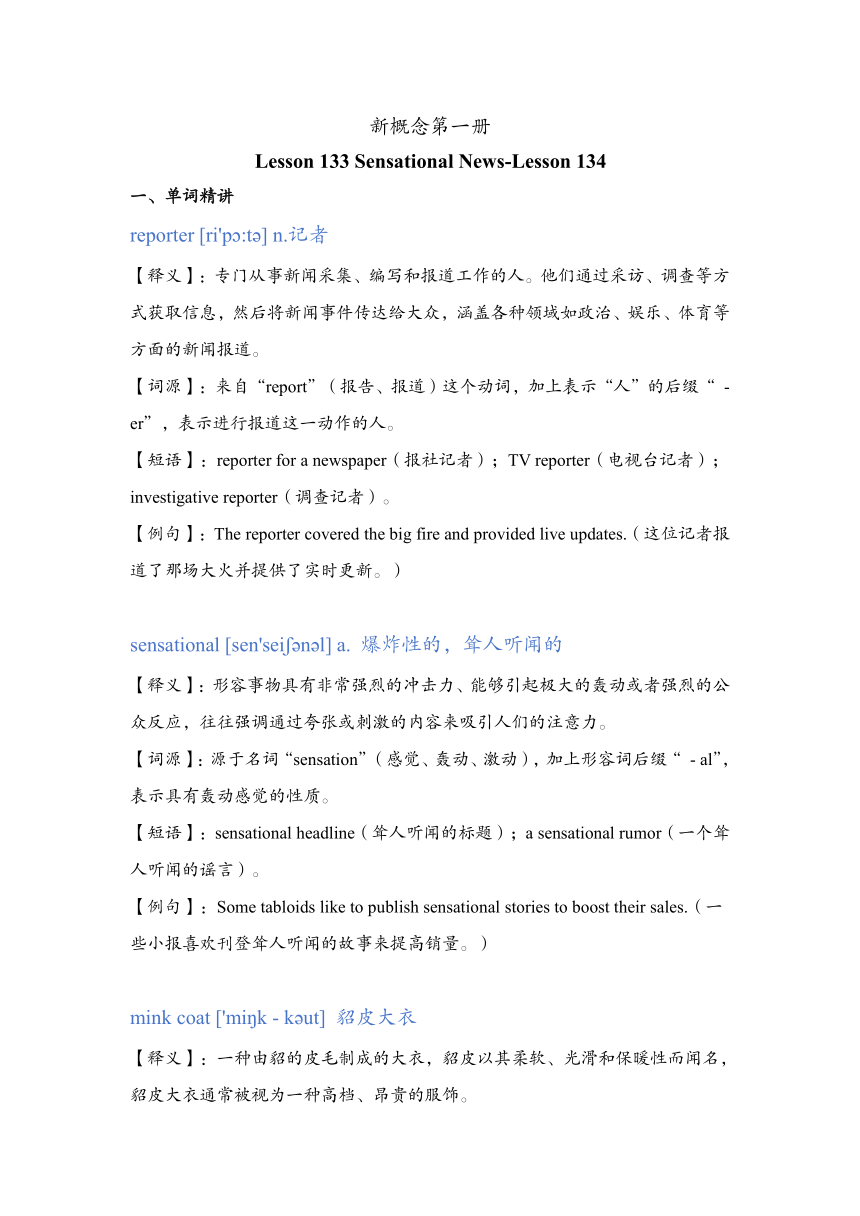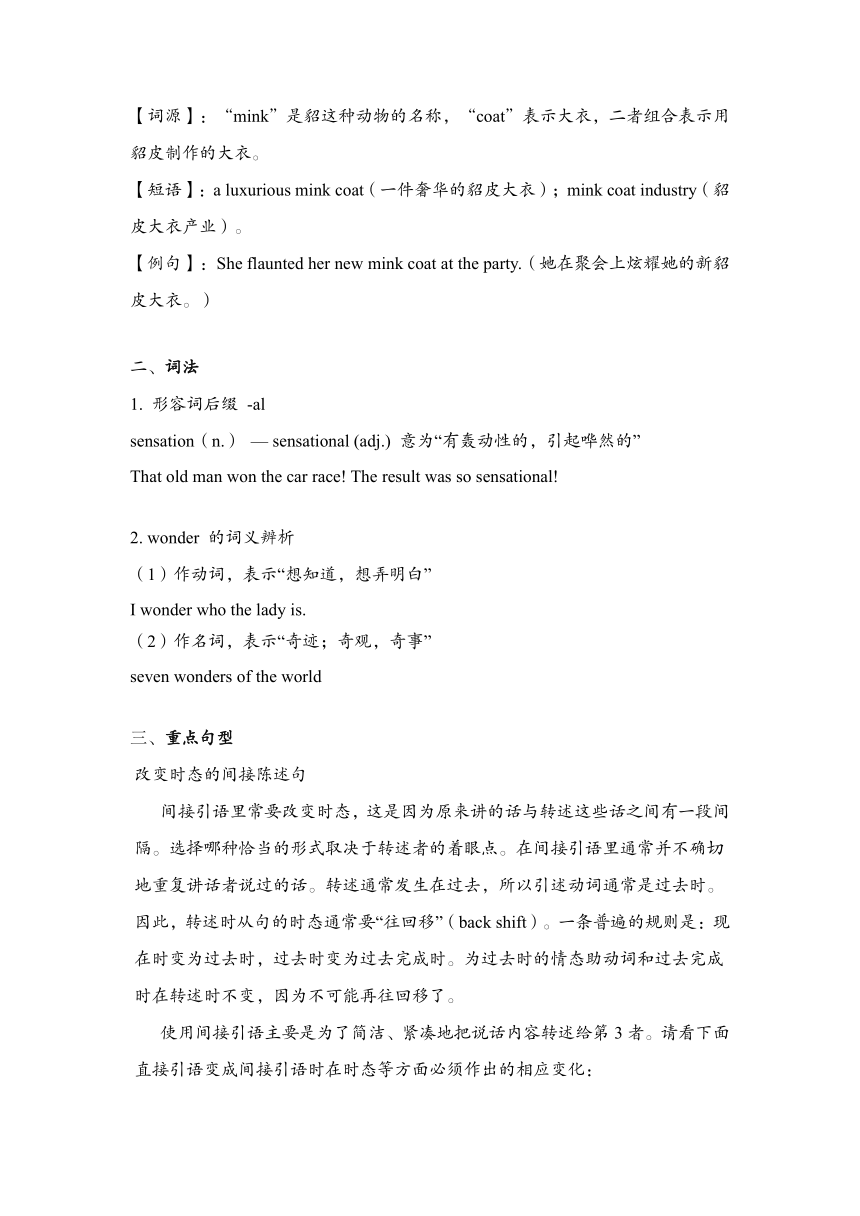新概念第一册Lesson 133 Sensational News-Lesson 134讲义
文档属性
| 名称 | 新概念第一册Lesson 133 Sensational News-Lesson 134讲义 |

|
|
| 格式 | docx | ||
| 文件大小 | 112.7KB | ||
| 资源类型 | 教案 | ||
| 版本资源 | 新概念英语 | ||
| 科目 | 英语 | ||
| 更新时间 | 2024-12-04 13:53:06 | ||
图片预览


文档简介
新概念第一册
Lesson 133 Sensational News-Lesson 134
单词精讲
reporter [ri'p :t ] n.记者
【释义】:专门从事新闻采集、编写和报道工作的人。他们通过采访、调查等方式获取信息,然后将新闻事件传达给大众,涵盖各种领域如政治、娱乐、体育等方面的新闻报道。
【词源】:来自“report”(报告、报道)这个动词,加上表示“人”的后缀“ - er”,表示进行报道这一动作的人。
【短语】:reporter for a newspaper(报社记者);TV reporter(电视台记者);investigative reporter(调查记者)。
【例句】:The reporter covered the big fire and provided live updates.(这位记者报道了那场大火并提供了实时更新。)
sensational [sen'sei n l] a. 爆炸性的,耸人听闻的
【释义】:形容事物具有非常强烈的冲击力、能够引起极大的轰动或者强烈的公众反应,往往强调通过夸张或刺激的内容来吸引人们的注意力。
【词源】:源于名词“sensation”(感觉、轰动、激动),加上形容词后缀“ - al”,表示具有轰动感觉的性质。
【短语】:sensational headline(耸人听闻的标题);a sensational rumor(一个耸人听闻的谣言)。
【例句】:Some tabloids like to publish sensational stories to boost their sales.(一些小报喜欢刊登耸人听闻的故事来提高销量。)
mink coat ['mi k - k ut] 貂皮大衣
【释义】:一种由貂的皮毛制成的大衣,貂皮以其柔软、光滑和保暖性而闻名,貂皮大衣通常被视为一种高档、昂贵的服饰。
【词源】:“mink”是貂这种动物的名称,“coat”表示大衣,二者组合表示用貂皮制作的大衣。
【短语】:a luxurious mink coat(一件奢华的貂皮大衣);mink coat industry(貂皮大衣产业)。
【例句】:She flaunted her new mink coat at the party.(她在聚会上炫耀她的新貂皮大衣。)
词法
1. 形容词后缀 -al
sensation(n.) — sensational (adj.) 意为“有轰动性的,引起哗然的”
That old man won the car race! The result was so sensational!
2. wonder 的词义辨析
(1)作动词,表示“想知道,想弄明白”
I wonder who the lady is.
(2)作名词,表示“奇迹;奇观,奇事”
seven wonders of the world
重点句型
改变时态的间接陈述句
间接引语里常要改变时态,这是因为原来讲的话与转述这些话之间有一段间隔。选择哪种恰当的形式取决于转述者的着眼点。在间接引语里通常并不确切地重复讲话者说过的话。转述通常发生在过去,所以引述动词通常是过去时。因此,转述时从句的时态通常要“往回移”(back shift)。一条普遍的规则是:现在时变为过去时,过去时变为过去完成时。为过去时的情态助动词和过去完成时在转述时不变,因为不可能再往回移了。
使用间接引语主要是为了简洁、紧凑地把说话内容转述给第3者。请看下面直接引语变成间接引语时在时态等方面必须作出的相应变化:
(1)一般现在时改为一般过去时:
‘I'm thirsty,’she said.
She said (that) she was thirsty.
她说她渴了。
(2)现在进行时改为过去进行时:
‘I'm having a rest,’ she told them.
She told them (that) she was having a rest.
她告诉他们说她当时正在休息。
(3)现在完成时改成过去完成时:
‘I've just made a new film,’ she told me.
She told me(that) she had just made a new film.
她告诉我说她刚完成一部新影片。
(4)一般将来时改成过去将来时(一般用would +动词原形):
‘I'll have to ask my husband,’she said.
She said (that) she would have to ask her husband.
她说她将得去问问她丈夫。
(5)情态动词由现在时改成过去时或条件时态:
‘I can see you tomorrow,’she said.
She said (that) she could see me the next day.
她说她下一天可以见我。
‘I'll help you,’she said.
She said (that) she would help me.她说她将帮助我。
‘I may return at six o'clock,’ she told me.
She told me (that) she might return at six o'clock.
她告诉我说她可能6点钟回来。
(6)为过去时或条件时态的情态助动词不变:
‘I could see you tomorrow,’she said.
She said (that) she could see me the next day.
她说她第2天会见我。
‘I would complain if I were you,’she told me.
She told me (that) she would complain if she were me.
她告诉我说,如果她是我的话她就会抱怨的。
四、课文精讲
1. Have you just made a new film,Miss Marsh
【译文】您刚拍完一部新电影吗,马什小姐?
【用法】(1)动词make与不同的宾语搭配具有不同的含义,在这句话中应理解为“拍(电影)”。
(2)have just made..…现在完成时态表示“刚刚才……__比如:
We've just heard the news that George won the game last night.
我们刚刚听说乔治昨晚赢得比赛了。转变成一边疑问句为:
Have you just heard the news...
(3)请复习现在完成时的标志词:already/just/never/ever/yet/before/so far/up till now/ until now/up to the present day/ since 2 weeks ago/ since 2000
2. I don't want to make another film for a long time.
【译文】很长时间我都不想再拍电影了。
【用法】for a long time 很长时间,for用来引导时间段。
瞬间动词不能与时间段搭配,需作变换,但在否定句中是完全正确的。比如:
His grandfather has died for 20 years.(搭配不 当)
His grandfather has been dead for 20 years.(正确)
We haven't bought any clothes for 3 years.(正确)
The soldier hasn't come back home for 2 years.(正确)
3. By our reporter.
【译文】由本报记者(报导)。
【用法】本句=Reported(Written)by our reporter.
4.I wonder why!
【译文】我很想知道为什么!
【用法】 wonder=want to know想知道。wonder后接宾语从句:
...wonder why/how/who/when/where
Lesson 133 Sensational News-Lesson 134
单词精讲
reporter [ri'p :t ] n.记者
【释义】:专门从事新闻采集、编写和报道工作的人。他们通过采访、调查等方式获取信息,然后将新闻事件传达给大众,涵盖各种领域如政治、娱乐、体育等方面的新闻报道。
【词源】:来自“report”(报告、报道)这个动词,加上表示“人”的后缀“ - er”,表示进行报道这一动作的人。
【短语】:reporter for a newspaper(报社记者);TV reporter(电视台记者);investigative reporter(调查记者)。
【例句】:The reporter covered the big fire and provided live updates.(这位记者报道了那场大火并提供了实时更新。)
sensational [sen'sei n l] a. 爆炸性的,耸人听闻的
【释义】:形容事物具有非常强烈的冲击力、能够引起极大的轰动或者强烈的公众反应,往往强调通过夸张或刺激的内容来吸引人们的注意力。
【词源】:源于名词“sensation”(感觉、轰动、激动),加上形容词后缀“ - al”,表示具有轰动感觉的性质。
【短语】:sensational headline(耸人听闻的标题);a sensational rumor(一个耸人听闻的谣言)。
【例句】:Some tabloids like to publish sensational stories to boost their sales.(一些小报喜欢刊登耸人听闻的故事来提高销量。)
mink coat ['mi k - k ut] 貂皮大衣
【释义】:一种由貂的皮毛制成的大衣,貂皮以其柔软、光滑和保暖性而闻名,貂皮大衣通常被视为一种高档、昂贵的服饰。
【词源】:“mink”是貂这种动物的名称,“coat”表示大衣,二者组合表示用貂皮制作的大衣。
【短语】:a luxurious mink coat(一件奢华的貂皮大衣);mink coat industry(貂皮大衣产业)。
【例句】:She flaunted her new mink coat at the party.(她在聚会上炫耀她的新貂皮大衣。)
词法
1. 形容词后缀 -al
sensation(n.) — sensational (adj.) 意为“有轰动性的,引起哗然的”
That old man won the car race! The result was so sensational!
2. wonder 的词义辨析
(1)作动词,表示“想知道,想弄明白”
I wonder who the lady is.
(2)作名词,表示“奇迹;奇观,奇事”
seven wonders of the world
重点句型
改变时态的间接陈述句
间接引语里常要改变时态,这是因为原来讲的话与转述这些话之间有一段间隔。选择哪种恰当的形式取决于转述者的着眼点。在间接引语里通常并不确切地重复讲话者说过的话。转述通常发生在过去,所以引述动词通常是过去时。因此,转述时从句的时态通常要“往回移”(back shift)。一条普遍的规则是:现在时变为过去时,过去时变为过去完成时。为过去时的情态助动词和过去完成时在转述时不变,因为不可能再往回移了。
使用间接引语主要是为了简洁、紧凑地把说话内容转述给第3者。请看下面直接引语变成间接引语时在时态等方面必须作出的相应变化:
(1)一般现在时改为一般过去时:
‘I'm thirsty,’she said.
She said (that) she was thirsty.
她说她渴了。
(2)现在进行时改为过去进行时:
‘I'm having a rest,’ she told them.
She told them (that) she was having a rest.
她告诉他们说她当时正在休息。
(3)现在完成时改成过去完成时:
‘I've just made a new film,’ she told me.
She told me(that) she had just made a new film.
她告诉我说她刚完成一部新影片。
(4)一般将来时改成过去将来时(一般用would +动词原形):
‘I'll have to ask my husband,’she said.
She said (that) she would have to ask her husband.
她说她将得去问问她丈夫。
(5)情态动词由现在时改成过去时或条件时态:
‘I can see you tomorrow,’she said.
She said (that) she could see me the next day.
她说她下一天可以见我。
‘I'll help you,’she said.
She said (that) she would help me.她说她将帮助我。
‘I may return at six o'clock,’ she told me.
She told me (that) she might return at six o'clock.
她告诉我说她可能6点钟回来。
(6)为过去时或条件时态的情态助动词不变:
‘I could see you tomorrow,’she said.
She said (that) she could see me the next day.
她说她第2天会见我。
‘I would complain if I were you,’she told me.
She told me (that) she would complain if she were me.
她告诉我说,如果她是我的话她就会抱怨的。
四、课文精讲
1. Have you just made a new film,Miss Marsh
【译文】您刚拍完一部新电影吗,马什小姐?
【用法】(1)动词make与不同的宾语搭配具有不同的含义,在这句话中应理解为“拍(电影)”。
(2)have just made..…现在完成时态表示“刚刚才……__比如:
We've just heard the news that George won the game last night.
我们刚刚听说乔治昨晚赢得比赛了。转变成一边疑问句为:
Have you just heard the news...
(3)请复习现在完成时的标志词:already/just/never/ever/yet/before/so far/up till now/ until now/up to the present day/ since 2 weeks ago/ since 2000
2. I don't want to make another film for a long time.
【译文】很长时间我都不想再拍电影了。
【用法】for a long time 很长时间,for用来引导时间段。
瞬间动词不能与时间段搭配,需作变换,但在否定句中是完全正确的。比如:
His grandfather has died for 20 years.(搭配不 当)
His grandfather has been dead for 20 years.(正确)
We haven't bought any clothes for 3 years.(正确)
The soldier hasn't come back home for 2 years.(正确)
3. By our reporter.
【译文】由本报记者(报导)。
【用法】本句=Reported(Written)by our reporter.
4.I wonder why!
【译文】我很想知道为什么!
【用法】 wonder=want to know想知道。wonder后接宾语从句:
...wonder why/how/who/when/where
同课章节目录
